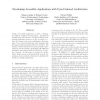Free Online Productivity Tools
i2Speak
i2Symbol
i2OCR
iTex2Img
iWeb2Print
iWeb2Shot
i2Type
iPdf2Split
iPdf2Merge
i2Bopomofo
i2Arabic
i2Style
i2Image
i2PDF
iLatex2Rtf
Sci2ools
110
click to vote
ACISICIS
2008
IEEE
2008
IEEE
Developing Accessible Applications with User-Centered Architecture
Design of accessible applications is often a challenge for software architects and developers. Development usually starts with structure and functionality of the planned application whereas it is also necessary to respect the complex needs of accessibility from the beginning. User-centered architecture starts modeling with the design and functionality of the user interface. The interface models include the necessary semantic information to provide Assistive Technology with additional annotation about functionality and behavior of interface elements. In this paper, a concept of a modeldriven design process is presented which uses the advantages of user-centered architecture to facilitate the design of accessible applications.
Accessible Applications | ACISICIS 2008 | Information Retrieval | Necessary Semantic Information | User-centered Architecture |
Related Content
| Added | 28 May 2010 |
| Updated | 28 May 2010 |
| Type | Conference |
| Year | 2008 |
| Where | ACISICIS |
| Authors | Sabina Jeschke, Helmut Vieritz, Olivier Pfeiffer |
Comments (0)

